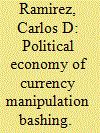| Srl | Item |
| 1 |
ID:
124558


|
|
|
|
|
| Publication |
2013.
|
| Summary/Abstract |
In recent years, one of the most frequently debated issues in Congress has been the value of the Chinese renminbi (RMB) relative to the U.S. dollar. Many members of Congress often accuse China of being a "currency manipulator." This paper has two objectives. First, it investigates the extent to which PAC contributions from key interest groups as well as constituent interests influence the frequency with which members of Congress criticize China's exchange rate policy, controlling for other factors. The results indicate that the odds that a congressman will call China a "currency manipulator" are 1.35 times higher for every $5000 in PAC contributions from groups that favor legislation against China. In addition, the results show that a one percentage point increase in the share of the congressional district labor force in manufacturing is associated with a 19.6% increase in the likelihood that the district's legislator will label China a "currency manipulator." Second, this paper investigates the consequences that "currency manipulation" bashing may have on the rate at which the RMB appreciates against the U.S. dollar. The results for a VAR model indicate that an increase in the incidence of "currency manipulation" bashing appears to temporarily slow down, rather than accelerate, the rate at which the renminbi appreciates against the dollar. This result suggests that bashing China may actually be counterproductive.
|
|
|
|
|
|
|
|
|
|
|
|
|
|
|
|
| 2 |
ID:
088464


|
|
|
|
|
| Publication |
2009.
|
| Summary/Abstract |
The 30 years of reform and opening have brought great material progress to China. By becoming a big country, China's actions created huge spillovers on other countries. The result has been a rise in trade tension between China and its trade partners. Recently, some have claimed that China's prolonged large trade surpluses have undermined global financial stability and tilted the world into a deep recession, if not a 1930s-style depression. Others have claimed that the greenhouse gases from China's industrialization would soon cause cataclysmic global climate change. One blunt but effective way to eliminate these negative spillovers is to restrict imports from China. Labor in the rich countries is under considerable stress because of the deep global structural adjustments brought by: (1) the integration of the labor force of China, India and the Soviet bloc into the world economy; and (2) the acceleration of technological innovations (as exemplified by the revolution in information technology). The new global equilibrium could be a win-win outcome for the world but the process of moving to it is a painful one. Protectionism to avoid the transitional pains is, however, likely to end up in a lose-lose outcome for the world. China must therefore, in its own interests, help to reduce international tension by updating its strategy of international economic engagement. China has to go beyond being a passive beneficiary of the WTO system to being an active promoter of WTO objectives. China should work with the US to bring Doha Rounds negotiations to a successful conclusion. China must also play a stronger and more constructive role in the forthcoming international talks on global climate change. China and India are simply too big to be exempted for a long time from national ceilings on the emission of greenhouse gases. China will have to face down its internal political opposition to replace the backward state-controlled financial system with a dynamic, but well-regulated, diversified private financial system in order to eliminate the odd phenomenon of a poor country lending to a rich country. For its neighborhood, China should push for an Asian Economic Union that takes the form of a WTO-plus free trade and open investment area that has regional pooling of foreign exchange reserves. Since there is no prospect of free labor mobility within East Asia, monetary integration would produce an economically inefficient outcome. East Asia should therefore be focusing its energy on creating as large a free trade area as possible, and forgo the unrealistic goal of a common Asian currency.
|
|
|
|
|
|
|
|
|
|
|
|
|
|
|
|